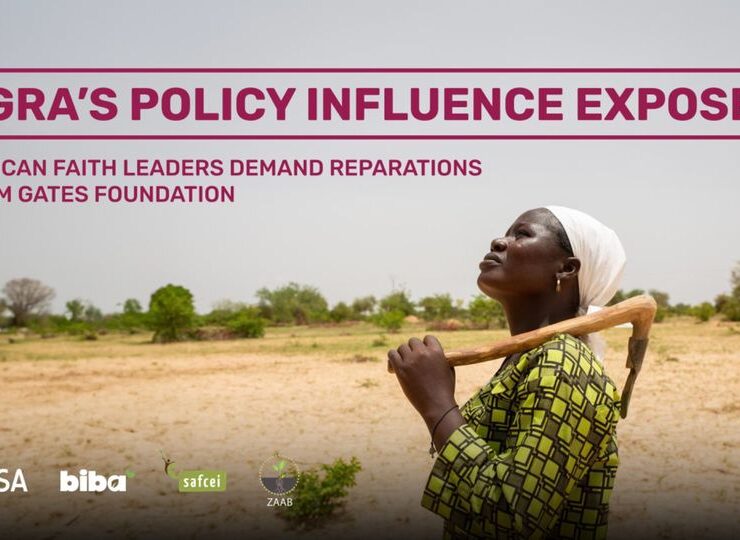
Chioma Phillips is the Editor of Msingi Afrika Magazine and…
Read Next
I’m writing this for the person or people in government or private sector who make policies or laws, who don’t know this, or haven’t thought about this. I’m writing it because I look around me and I really wonder if humans have vacated their office and have been replaced by heartless robots which are determined to destroy the human race. I’m very serious. I’m writing specifically with Afrika in mind, but I am including the rest of the world, because ultimately we are actually one community and our actions affect one another. We are not one community like the globalists want to create with their sneaky agendas and schemes; we are one because we actually came from One Source of Life and Being and that’s Who links and unites us and not the WHO. I am writing from a place of hope and expectation. I am writing from a womb that is crying out for things to change in Afrika and in the world, because they have to change if things are ever going to get better.
We are not thriving currently as a people in Afrika and in the world. No, we are just existing and barely making it from moment to moment and from day to day, in a series of mindless routines that maintain momentum but only succeed in painting a thin veneer of pretense over the reality of failed lives and failed societies. Not simply because of a lack of money and not because of the Covid economic shut-down, no, even the people who have money are barely making it. They are stressed out and unhappy people because they have figured out that money may buy them some stuff, but the satisfaction they are seeking in life isn’t found on any supermarket shelf or in a car showroom. They have figured out that their money will not fulfill them as people nor turn their children into geniuses, or make their homes genuinely joyous, no matter how many times they go to KFC or how many toys they buy or how much they earn or ‘misappropriate’ (i.e. steal) in order to do what they think will make them satisfied in life. In fact the lock down has forced them to come face to face with the fact that the lives they are leading are superficial at best, and phony at worst.
I recently read an article from 2019 that talked about the Afrikan CEO of a well-known and respected growing Afrikan company. The author of the article talked about this CEO – who is quite celebrated in the media and corporate circles – as being mean to their employees, withholding their pay and causing them all out misery, all the while portraying the image of a ‘successful’ brand in the eyes of their ‘peers’ and the world. You see what I mean, the lives of many are as fake as steel toes mixed with mud, but people persist in them instead of stopping to take stock. But their governments are equally guilty and they’re not stopping their charades, so the people follow suit. Let me tell you, this is dumb as a frog in a hot pot of water. We must strip ourselves of the vanities of living that we have decided are cool just because we saw them in some super-fake movie from Hollywood and get back to the basics.
For your physical body, you need air, water, food, clothing, shoes (sometimes) and safe shelter so you don’t get exposed to the elements. You do not need billions in the bank, four cars, one house on every continent and a shoe collection like Imelda Marcos’. Those are vanities. For your soul you need a heart of compassion and love, one that is forgiving. You need to consider others’ needs and their state and sometimes you need to sacrifice your own comfort so that someone else can get the basics of life or even something that you wanted for yourself. Those are necessities. You don’t need the approval of others, or to be invited to conferences where they call you the top x under x or y over y, or the richest whatever in whatever. In short, you need to stop being selfish and self-centered and become a genuine real person who returns to the basics of love instead of lordship over others. This is what will save your life in the days ahead and beyond that. This is what will help you see and know what is real and what isn’t and help you build a future for the community, country or world that you’re in.
Below are some practical ideas which, while not being the entirety of the matter, could certainly get the ball rolling in helping to restore our humanity and identity as people and brothers:
Overcome Greed and Complacency
Years ago a former colleague of mine told me about a company that was blatantly exploiting their customers through the charges that they were levying on certain products. It cost them next to nothing to provide theseproducts but they said to themselves, “Well, we can get away with it, so why not?” They still do so to date. Needless to say, this company is quick to run to the media to proclaim their greatness when their periodic results are announced. No one cares to look below the surface to see how they made their money, and literally everyone I know continues to use their products all the while complaining about the poor quality and high cost. Not that there aren’t other halfway decent suppliers in the market, it’s just that it’s deemed more ‘convenient’ to use these exploiters and so they are sustained by their greed and their customers’ complacency. The company is unrelenting in its application of its charges and continues to apply them, despite knowing that if it lowered costs, customers from lower income groups would actually have an easier time of it and be able to genuinely do more, both on the company’s platform and with the money saved from reduced charges.
Likewise, the complaining users are not ignorant of their power to influence changes in the company, but they just shrug and say, “But what can we do? Our hands are tied.” This is easily the most give-up-ish thing I have ever heard a human being utter in my life and is generally applied to every situation on earth where the person wants to continue to whine and wail but not act to change their circumstances. Of course you can do something. It may inconvenience you along the way, but by your choices you can walk away and influence others to walk away and before you know it, the numbers will force a change of behavior; whether you will go back or not, having realized that the supplier was well able to have changed their behavior all along, but didn’t, is a different matter. So instead of marveling at the amount of profit that a company is making and lauding their claimed success, take heed to note the heart of what they do and why and how they do it. If you know that they are greedy and exploitative, do not reward them with your worship, applause and through imitating their behavior but rather do something positive to change it. Even the smallest thing, like removing your support for them by finding a different provider can make a very loud statement spiritually about you and them and even serve to clear your name where you were acting contrary to your word. When your words and actions match that is integrity, where they don’t your moral authority is eroded, as is your ability to effect change in this and other areas. Integrity gives you a leg to stand on when teaching the next generation.
Speak up against injustice
Let’s take the unlikely example of the taxman to look at the issue of injustice. The taxman has a heavy burden and it is not cash collection. The taxman is faced with collecting cash for a regime that may or may not be keeping its word and honoring its commitments to its citizens. In the case where the taxman may be collecting cash for an unfaithful and greedy government that is simply consuming the hard-earned money of its employers (the citizens) as if it was water from an unending fountain, and taking for granted the fact that the law compels their compliance then we have a situation of injustice. The taxman may be enforcing regulations that have been imposed upon him and watching the money that he is trying to collect from stressed out citizens (who may be in danger of shutting down their businesses because of a difficult economic climate) being spent on trifles and salaries for greedy employees who to make unending selfish demands. This taxman is now actually in an awkward position, for he knows the challenges he faced while collecting this money and the very real stories of hardship that he heard from those he sought out to make their ‘contributions’. While on the other hand, he sees the wastage and the reckless spending that is going on, as he is being pressurized to collect more and more and yet more from the people.
You may or may not agree with me, but I strongly believe that he has the moral obligation to speak up against this injustice. Rather than take the stick to the citizenry who are crying under the burden of increased taxes, he has the moral duty to turn this stick onto the ones who are involved in the wastage of resources. Why? They are guilty of unfaithfulness and thus are the ones making his job harder. Those who are contributing money under force of law have observed the spenders’ avaricious ways, while not seeing any wider benefit to the society. For now, we must turn and face the collector of this revenue who is answerable to himself, to the one he is collecting it from and to the ones spending it, to keep the spenders true to the intent of the collection by speaking up where and when he sees this injustice pervading. If for nothing else than to save his immortal soul.
Now to the one paying the money into the hands of those who are wasting it, upon seeing this waste they must speak up and not remain silent, because this wastage is upon their heads. Complaining alone will not get them answer and neither will sulking or sitting around in fear or throwing stones in anger when the frustrations seem to become ‘too much’. They must hold their employees to account (the recipients of the cash and those spending it) for every coin and demand some form of accountability from them if they refuse to honor their commitments. Why do I say this? Their inaction and refusal to speak and act against this is an injustice against themselves as the givers of the money and against society as a whole. Wrongs are going unaddressed and a culture of dishonor is being entrenched throughout the entire societal system because of the people’s choices not to act or speak but instead to simply complain and then sit back until they are frustrated again. Something needs to be done to shift the behavior. This ‘something’ is not limited to the ballot and it can include the courts of law, under which even the withholding of said funds may be possible until the employees change their behavior and learn some manners. We are responsible for the society we are building. Supporting certain types of behavior makes one complicit in the injustice. Again, if only for the sake of one’s immortal soul, one must speak and act.
Create a Culture of Care
There’s a company I have had the displeasure of having dealing with that provides a service that has become something of a necessity. It’s a monopoly, so no one can really get away from it, unless they are able to make a hefty cash investment in the equipment required to escape their clutches or do without their services altogether. The company doesn’t care, it never loses. If you don’t pay, then you don’t get the service and in order to get the service, you have to pay. When you call to report a service outage you are met with responses such as, “You just have to wait.” The support staff even gets belligerent if you try to press the issue to explain to them that there has been a trend in service failure that you want addressed for the long run. Service quality is not a priority to them, except when it will cost the country investor dollars (i.e. they were threatened by someone they deem worthy of responding to.)
I’m told that this company charges on the basis of neighborhood. Some neighborhoods pay more for their services, like it or not, because of their perceived high status. Meaning that no matter what cost saving measures these families try to put in place, they will continue to be hit with the same fees over and over and over again. The irony of the culture we have created is that one can live in such a neighborhood and actually have little or no money, so while their classification should really be for a different income group, because their home is situated in the ‘rich’ area, they pay ‘rich man’s’ prices. The service provider doesn’t care and any appeal to make changes is met by a lot of promises to act, but since company policy has already been set, the neighborhood must pay, so it’s residents must pay.
Contrast this with someone who was selling water to my husband and I recently. The house we live in has water that is not potable, so we purchase water for drinking and cooking, yes, in 2020. This is something common in many neighborhoods across the country, yet despite that, bottled water was recently classified as a luxury item and subjected to additional levies. Anyway, we recently found a lovely spot where the water cost half of what we used to pay, but on a particular day when we went for a top up, having carefully factored in the cost into our budget, we were told that some new regulation by the taxman prevented them from selling to us as long as we had bottles that belonged to another company. (So much for recycling initiatives) Anyway, we needed water and went to a supermarket that was close by, whose prices are much higher and as a result we were a little short of cash. We explained the situation and the man in charge of the water section not only sold us the quantity we needed, but he topped it up a little and then gave us a little money so that we could bridge the gap between what we had and what it cost. We didn’t beg, we didn’t cry or have to humiliate ourselves like some people seem to want others to do before they offer their help, we didn’t have to justify the value our existence on the planet. We simply explained our situation and tried to find a workaround and we got our water because someone saw us as people, like himself. Not only that, he didn’t despise our purchase at all. He treated us like we were every other customer paying the full rate, taking the time to heat seal our bottle with such care that he left us almost speechless. We were blown away by the fact that he just… cared. Yes, in 2020.
To lack compassion in anything you do from lawmaking to stitching a shoe robs society of much needed life, because all you will do is pursue your own goals, be it to make more money or gain status or whatever, all at the detriment of the customer, or your citizens and your society as a whole. This allows you to ‘get ahead’, while stepping on the heads of your brothers, but your stench is foul. What manner of culture is that? Heartless and hard and mean spirited and it engenders so much ill will and stress that it sickens the heart of the society. I have read that in America, for instance that law makers are considering putting in place provisions to allow the government to take temporary custody of people’s children so as to vaccinate them and then return them to their parents to deal with. This despite the same government having paid billions in vaccine injury compensations, meaning that the parents’ have very valid concerns about the safety of their children and simply want these concerns addressed but the lawmakers want to achieve the goal of vaccination… for whatever end and no matter the cost to the people. A society with a culture of care takes all concerns into account and creates a plan that is safest and best for all, not most convenient for the government or businesses.
Mindfulness in choices, law and policy making
We spoke about mindfulness in a previous issue of the magazine which I strongly recommend that you read alongside this, if you haven’t already.
Recently I said to someone that in my view, if a person wants to start a business, it makes sense for the government to make it as affordable for them to do so as possible. This means that licensing fees, equipment, commercial space, power, water and taxes need to be as favorable as possible, in order for one to be able to build their business, earn money to be able to pay for various costs, hire people and grow. This is particularly needful for people who don’t have deep pockets and are just starting out. That way unemployment is reduced, poverty is reduced, more people are independent of state support or support from their families, giving everyone the room they need to expand in some positive way. People can then pay for services like medical cover (if they so desire), purchase vehicles, homes, equipment etc, which creates stable and predictable growth for the country as a whole. As a result, the population is not as stressed out as they might be in over-taxed, over-licensed regimes and they can get on with the business of doing what they need to do, free from dependence on external support like aid, because the environment is conducive for them to thrive in. I know it sounds utopic, but this really should be the norm and for us to consider this a pipedream means that we are in actuality living out a nightmare. I believe it is possible and that some governments actually make this possible for their citizens. Unlike a sad story I read some years back where a young group of Afrikan entrepreneurs in Kenya had an innovative idea that they wanted to run with, but by the time they were done paying the government its fees and costs, they just closed up shop and the idea was shelved. Just like that, policy and political promises clashed and government policy won.
When a government decides to increase taxes on citizens who are already struggling to make ends meet, in an environment where large and small businesses alike are struggling to stay afloat, it is a puzzling thing. And when this same government decides to take on more debt, which puts even more pressure on its citizens to pay back loans that they are barely seeing the benefit of, it is highly disconcerting. The role of the government is to enable, support, protect and facilitate – not themselves, but the people they were hired to represent. They are meant to ensure that public funds are spent wisely, that trade negotiations with other countries are favorable instead of detrimental, that their local people are fully supported in their endeavors to the point of even having an advantage over a business that seeks to enter the market from outside of the country… as opposed to the favors rich investors are given when they knock on countries’ doors these days. A government is meant to be keen to ensure that their people are the priority in terms of the quality of food they consume, the air they breathe and the water they drink. That their people feel secure, rather than threatened by security forces, such as police, and that friendly dialogue is possible between citizens and their employees in the government.
Oil producing countries, for example, tend to pass on the benefit of this naturally occurring resource to their citizens in the form of affordable fuel and even free education and government services. Countries focused on the growth of the ICT sector usually find ways to reduce the cost of access to equipment like computers and mobile phones, reduce the cost of and improve the quality of internet, countries focused on manufacturing find ways in which to ensure that the process is as cost-effective as possible, even providing financial cushioning to businesses during times when things are not so bright, because they want to ensure that these companies remain afloat and are able to continue on after the crisis is averted, because they understand the value these businesses contribute overall – not that they turn it into occasion for yet more favoritism.
A mindful government builds without ego, not caring that the next government may take the glory for the foundations that they laid, but desiring to leave a solid and beautiful foundation for the next person to build upon. A mindful new government is keen to build on the previous foundations, if they were good ones, rather than feeling undermined by what came before them. A mindful government builds with consideration for the generations that will come which will find the fruit of what they have set in place and they keeps in mind that the quality of what they produce reflects upon them not only as a government but as the individuals who form that government. They are cognizant that stealing from the public coffers reflects upon them badly. They are aware that the choices that they make form the seeds of the culture that is around them in the country. They are aware that they cannot go home and sleep in peace, knowing that they were responsible for destroying lives and harming generations. They are aware that their actions are closely watched and mimicked by the private sector and by individuals alike, creating either a suffocating culture or one filled with life, depending on the choices that they are making. It really is that simple. A government that uses threats and force to get its way first of all has already lost favor with the people and secondly creates a culture of bullying and intimidation that will trickle down to the entire society and that will take a courageous one or few or many to overcome out of fear of loss of livelihood, liberty or life.
There are some countries where politicians teach their citizens the worst of manners. Through their choices and actions, they frequently teach people dishonor instead of honor, cowardice instead of boldness, how to lie and to be unfaithful to their word, how to be disloyal and how to be self-preserving, how to be selfish and how to sell out your people to those who want to destroy them. They teach people how not to keep promises and how to steal, how to be selfish and how to manipulate others so that they can get their own advantage. They also teach people how to corrupt and influence others or situations as negatively as possible. They even teach people how to use force and even witchcraft to get their way, how to kill and worst of all, they teach people to think that they can get away with doing whatever they want to do, for however long. This is, sadly, what many people who are elected to public office model by their words, their choices and their actions, whether they know it or not and that creates a culture. We cannot deceive ourselves that this is something anyone can get away with, because one way or another it always catches up to you.
As individuals, we have to – regardless of what we see – deliberately and thoughtfully choose the things that will make up our culture and make up who we are and choose things that will cause life and beauty to flow one to another, because we have to be aware that regardless of which culture has taken the seat of power in the company we work for or the country we live in, we are ultimately responsible for influencing the mindset and culture of the next generation. We must remember that we are responsible ourselves for what we choose to live out, whether we are in the most evil of places or the loveliest. Whenever and wherever the opportunity presents itself, we must caution and guide those who we have given positions of authority to remember that, above all else, they are answerable not even to us, but to the Highest of all authorities and to urge them to keep that in mind in all that they do. If for nothing else, then for the saving of theirs and our souls as the minimum.
These few things can help steer us away from danger, such that even in these perilous times, we can perhaps find hope that, though there is wickedness, there are those who are determined that – because they live – it shall not prevail and they have made it their life’s purpose to ensure that as far as it is possible with them, righteousness will stand.We are our brothers’ keepers.
Subscribe now for updates from Msingi Afrika Magazine!
Receive notifications about new issues, products and offers.
What's Your Reaction?
 PIN IT
PIN ITChioma Phillips is the Editor of Msingi Afrika Magazine and the host of Msingi Afrika Television. Her hope is to see the Truth shared, with all who will listen, for the transformation of the people and the continent of Afrika - and the world. She believes passionately in the critical role that Afrika and Afrikans have to play on earth right now and hopes to ignite the spark that will cause them to see and believe who they are, so that they can live out their Truest lives for the remainder of their days.





















